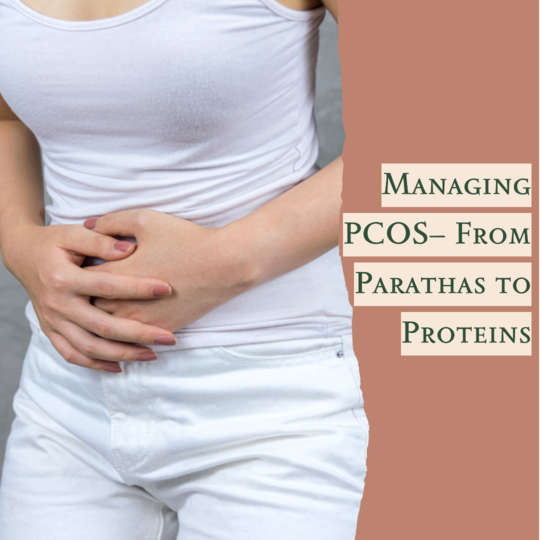The best healthy substitutes in Indian cuisine to help you combat PCOS symptoms!
Polycystic Ovary Syndrome (PCOS) is a common hormonal disorder that affects millions of women around the world. In fact, almost one in every five women in India suffers from painful symptoms of PCOS, according to the Indian Journal of Endocrinology and Metabolism. But just because PCOS is common, doesn’t make it any less difficult to live with. The symptoms of PCOS can range from extremely painful periods to unpredictable mood swings and are notoriously hard to manage. And the fact that there is no cure for it is just another disappointing thing you have to deal with if you suffer from it.
But what if we let you in on a little secret that could help you manage your symptoms and lead a sacrifice-free life even with PCOS? Yes, making small changes to your diet can have a big impact on managing your symptoms! Indian cuisine can be both good and bad for PCOS depending on how a particular dish is prepared or consumed. Certain traditional Indian diets can be high in carbohydrates, refined sugars, and unhealthy fats that really agitate your symptoms and make your PCOS flare up. But by making the right substitutions to your regular diet, you can create a PCOS diet plan that makes symptoms go back into remission.
Don’t worry, we’re not going to make you eat bland and tasteless meals for the rest of your life just so you don’t have to deal with those pesky symptoms anymore. There is no one-size-fits-all PCOS treatment diet that you have to follow every day, for all the days to come. We are talking about making a few substitutions to your daily meals, not completely shifting to a PCOS diet plan. With these substitutions, your taste buds and your body will be thanking you!
Swap White Rice with Brown Rice or Quinoa
When it comes to Indian cuisine, not a day passes without having rice for a meal. Although it can be easy to prepare and absolutely fulfilling, white rice could be worsening your PCOS symptoms! White rice is known to spike blood sugar levels and increase insulin resistance. The closest alternative to white rice which might be even tastier and just as easily available is brown rice. With its high fiber content, brown rice keeps your sugar levels in check while keeping you full for longer. You can also try switching to quinoa if you want a bit of adventure on your PCOS diet plan.
Ditch Refined Flour for Whole Wheat
Yes, it’s time to finally say goodbye to the white-flour rotis and parathas you have every day. But don’t worry, there is an even tastier alternative– whole wheat rotis. While refined flour or maida is known to increase inflammation and insulin resistance in PCOS patients, whole wheat flour is a low-carb alternative that is packed full of nutrients and fiber without compromising on taste. You can also switch to gluten-free flours like almond flour, coconut flour, or buckwheat flour for baking too.
From Oily, Deep-Fried to Baked and Grilled
Can our evening cup of chai or office coffee breaks ever be complete without biting into a crunchy samosa or steaming pakora? Deep-fried snacks like these are ingrained into our lifestyles from a very young age. But unfortunately, they are not doing any good for your PCOS symptoms. We won’t lie to you– switching to baked samosas and grilled pakoras might take some getting used to but it’s totally worth it! After all, you will get to enjoy your roasted chana (chickpeas) and grilled paneer tikka without worrying about a huge acne breakout the next morning!
Replace Sugary Desserts with Natural Sweeteners
Rasgulla, gulab jamun, laddoos, ras malai– if we start listing every Indian dessert, this would end up being a whole book! Indians, without a doubt, are born with a sweet tooth. And sometimes, no matter how much you try to control them, these sugar cravings can get the better of you. It would be cruel to tell you to cut sweets completely out of your life. But try to swap those sugary treats out for desserts made with natural sweeteners like jaggery or honey. You can also try making desserts with low-carb flour like almond flour or coconut flour for guilt-free indulgence. Fruits are also a great option when you feel like you are eating too many unhealthy desserts.
Choose Low-fat or Non-fat Dairy Products and Healthy Oils
Creamy curries and stir fries are unavoidable aspects of Indian cuisine. We often use ghee or vegetable oil for cooking, but they can be unhealthy for PCOS. Using healthier options like olive oil or coconut oil, and ensuring that you keep oil consumption on the low can do wonders for your progress with PCOS. The high antioxidant content of these healthy oils can help reduce inflammation while providing healthy fats. Additionally, swapping full-fat dairy products like milk and paneer with non-fat or even low-fat options can also help your PCOS symptoms. You can also try using curd or buttermilk instead of high-fat yogurt due to their lower carbohydrate levels and amazing cooling properties, especially in the summer.
Managing PCOS can be challenging, but it doesn’t mean you have to give up your favorite desi dishes and stick to a rigorous PCOS diet plan. With a few simple swaps and changes, you can enjoy your favorite foods and still keep PCOS under control. Don’t be too hard on yourself if you indulge in a little rasgulla or pakora now and then. Just keep these tips in mind, and you’ll be on your way to a healthier and happier you in no time. And trust us, your taste buds won’t even know you’re on a PCOS treatment diet!






